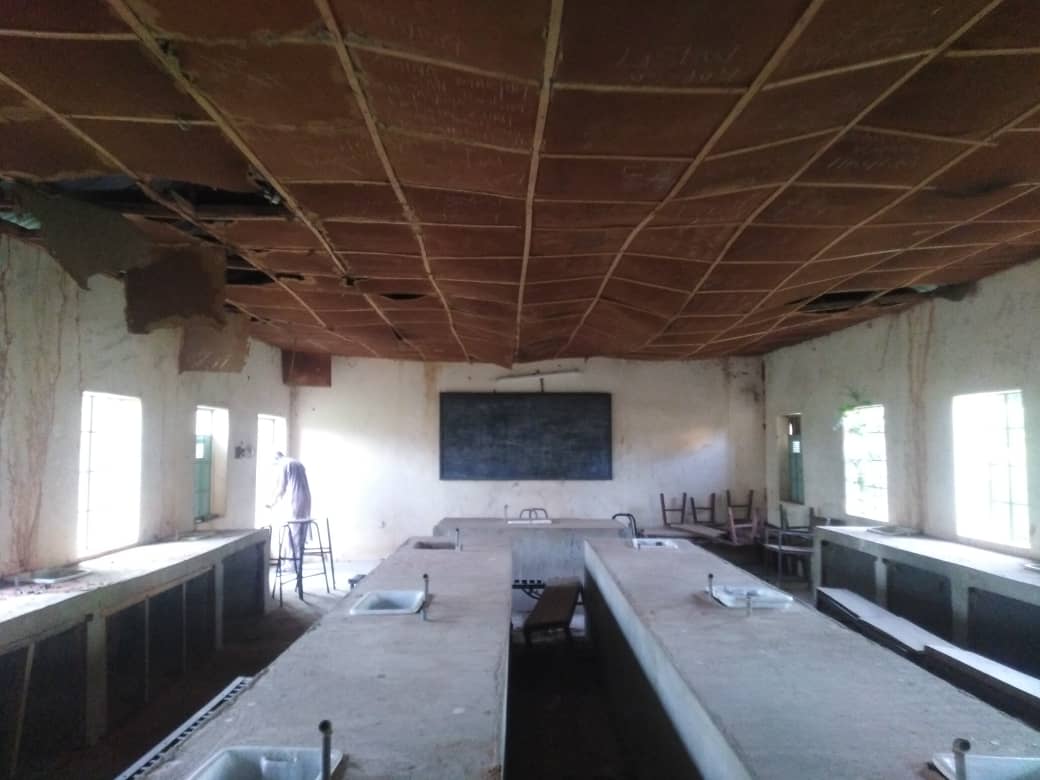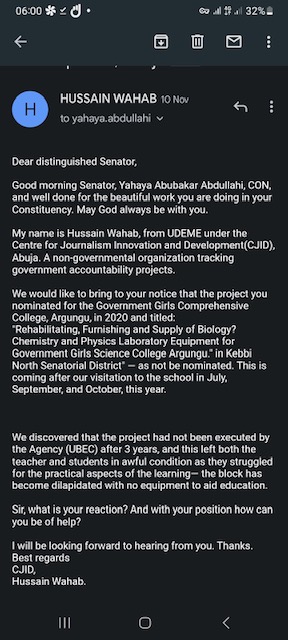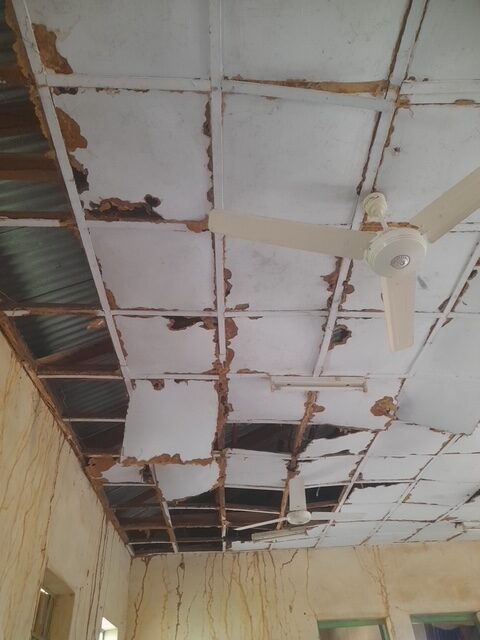INVESTIGATION: UBEC mum as N80m Kebbi secondary school lab equipment still undelivered since 2020
“Our laboratories are not conducive for learning; the termites have destroyed most of these laboratories, and there is not enough equipment in the school to use for our practicals and assignments.”
On a cold Monday morning, students of the Government Girls Science Comprehensive Secondary School, Argungu, Kebbi State, could be seen trooping into their various classes immediately after the assembly.
This time, the SS2 students were all set and seated, paying attention to Aliyu Abubakar, 50, a Chemistry teacher teaching ‘Volume Analysis.’
But most of the students were confused as the teacher taught in abstract terms.
Mr Abubakar was uncomfortable with the situation. One would wonder why they chose the classroom instead of the laboratory for the lesson. The only ‘equipment’ the teacher had were a chemistry textbook, board and chalk.
“Since there is no functioning equipment in the dilapidated laboratory in the school, we have deserted the laboratory for years, and what we’re teaching is just abstract. We are supposed to be in the laboratory for practical purposes and clear understanding but could not,” Mr Abubakar explained.
According to the Journal of Education and Practice, utilising laboratories instils scientific attitudes among students, fosters practical learning, and helps to hone their problem-solving skills. It also recommended that science subjects, including chemistry, be imparted in well-equipped laboratories.
The journal emphasises the need for government support in constructing and outfitting science labs and recruiting more qualified teachers to ensure the effective operation of the secondary education system in Nigeria.
Nuhu Lawal from the Department of Science Education, Federal University, Gusau, Zamfara State, explained how most of the secondary schools in the state lack well-equipped laboratories while those in rural areas have none, resulting in poor learning and performance.
“Unequipped secondary schools, particularly in rural areas, hamper practical learning, impeding students’ acquisition of vital laboratory skills and hindering the understanding of scientific concepts. This deficiency fosters examination malpractice, negatively impacting science students’ performance in higher education.”
Mr Lawal, while emphasising the importance of laboratories to science schools, further said that state and federal governments should construct well-equipped laboratories in schools, upgrade existing facilities, and increase funds for perishable laboratory items.
Laboratories
A visit by this reporter to the school in July, September, and October revealed a disheartening truth – the lab project had not been executed by the Universal Basic Education Commision, (UBEC) the agency in charge, even after three years of nomination.
This reporter gathered that all the laboratories nominated for rehabilitation and equipping, which include chemistry, physics and biology laboratories, are in bad shape.
The consequences are dire: some of the classrooms remain dilapidated, and teachers and students lack essential laboratory equipment for practical learning.
Fatima Ibrahim Asma’u, 16, an SS3A student and assistant senior prefect girl, expressed her dissatisfaction towards the abandoned laboratories, stating how the labs had become home to termites and other insects.
“Our laboratories are not conducive to learning; the termites have destroyed most of these laboratories, and there is not enough equipment in the school to use for our practicals and assignments.”
She urged the government to build new laboratories with equipment for the school or at least renew the existing ones.
Musa Abdulkarim, the vice principal, said that the laboratories, which had existed since the school’s inception of 2005, 18 years ago, “have been crying for equipment for a long time with no attention”.
Walking to the path that led to the laboratories, the principal pointed to them, lamenting the fate that bedevilled them.
“This is the physics, chemistry, computer and biology laboratories. It is of no use to our students again.
“It has been constructed since 2005; up till now, we are still in the process of seeing the places renovated,” said the vice principal.

Physics Laboratory at Girls Science Comprehensive College Argungu
Photo: Hussain Wahab
Eyesore
Government Girls Science Comprehensive Secondary School, situated in Argungu along Birnin Kebbi road, Kebbi North Senatorial District, established in 2005 and commissioned by former president Olusegun Obasanjo in 2006, was one of the schools in Argungu that Global Academic said were experiencing setback in the recent years due to lack of facilities and underfunding as seen in their 2022 research titled: ”The Role of School Facilities and Staff in Enhancing Academic Performance of Secondary School Students in Birnin-Kebbi and Argungu Zonal Education Areas of Kebbi State, Nigeria.”
To bring an end to some of the educational challenges in the school, the lawmaker representing the constituency, Yahaya Abubakar, in 2020 nominated a consolidated project for the Rehabilitation, Furnishing and Supply of Biology, Physics and Chemistry laboratories with the hope that it will aid the school and give access to good education.
Three years down the line, the project appears abandoned.

Mail sent to the lawmaker
The projects
According to the 2020 Kebbi State Zonal Intervention Project, the federal government budgeted N80 million for a project titled “Rehabilitation, Furnishing and Supply of Biology, Physics and Chemistry laboratories at Government Girls Science Comprehensive Secondary School Argungu LGA, Kebbi North Senatorial District.”
It was assigned to the Ministry of Education and placed under the supervision of UBEC. The project was sponsored by Yahaya Abubakar, the constituency lawmaker.
UDEME, a platform monitoring government projects under the Centre for Journalism Innovation and Development, gathered that the 2020 project had yet to be executed by the Agency.
It is not clear if the approved funds were fully released by the authorities.
Speaking with UDEME, the Vice Principal, Mr Musa, said he was not happy with the state of the laboratories and is awaiting government intervention. “In fact, not until now, I was not aware that N80 million was budgeted for our laboratories,” he added.
The dire need for suitable facilities in the school mirrored the comment of Habiba Yusuf, 18. The Senior Prefect who said “students don’t even know how to use the lab”.
“Our laboratories are not conducive for learning because we don’t have good seats and enough equipment to use,” she said. “We will be happy if we get somebody to do it for us. The situation of the laboratories is affecting us; even if we are given assignments, we don’t know how to go about it.”

Physics and Chemistry labs
Efforts
A Freedom of Information (FOI) request was sent to UBEC in Abuja, on the 18th of October seeking comments. The Agency has yet to respond to the information requested as at the time this report was filed.
This violates the provision of section 4 (a) and (b) of the Act which provides that the information requested should be responded to within seven days and if the institution should deny the request, a written notice shall be addressed to the applicant.
Also, after trying several means to reach out to the lawmaker representing the constituency, the reporter sent an email to him.
However, as of the time of filing this report, the lawmaker has yet to react to the email sent as regards the situation.
By Hussain Wahab
This report was produced under the UDEME project of the Centre for Journalism Innovation and Development (CJID).



